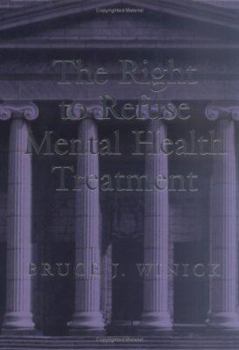The Right to Refuse Mental Health Treatment
Select Format
Select Condition 
Book Overview
This text provides a comprehensive treatment of the legal issues surrounding the right to refuse mental health treatment. Professor Winick lays the groundwork by examining six different mental health... This description may be from another edition of this product.
Format:Hardcover
Language:English
ISBN:1557983690
ISBN13:9781557983695
Release Date:January 1997
Publisher:APA Books
Length:427 Pages
Weight:2.53 lbs.
Dimensions:1.5" x 7.2" x 10.3"
Customer Reviews
1 rating
Insightful
Published by Thriftbooks.com User , 23 years ago
Although Bruce J. Winick does not include a preface in THE RIGHT TO REFUSE MENTAL HEALTH TREATMENT, it is obvious that the appropriate audience for this book includes judges, lawyers (both defense and plaintiff), psychiatrists, psychologists, clinical social workers, and counselors. THE RIGHT TO REFUSE MENTAL HEALTH TREATMENT can be best described as a comprehensive assessment of the decision making process regarding involuntary clients, patients and, of course, prisoners. With 20 chapters divided into three sections, it offers a significant contribution both to law and to clinical mental health intervention. The sections include:* Mental Health Treatment Techniques (seven chapters) * Constitutional Limitations on Involuntary Mental Health and Correctional Treatment (eight chapters) * Evaluating and Implementing the Right to Refuse Treatment (four chapters)Winick is an excellent writer! Regardless of one's discipline (law or mental health), one will find this book a worthwhile asset in one's library. When Winick initially introduces a complex legal concept in one chapter and the same concept must be introduced later, he employs one of two effective strategies. He either writes a summary of his earlier work or he cites where the reader can find more details of the legal concept. This strategy is critically important and useful for this type of book. For example, many people will not read this monograph from cover to cover, but rather read sections that are needed to achieve a necessary goal for a client. Winick's artful style is particularly beneficial for this type of reader. In addition, the index is excellent! It includes both a "table of authority" (cases) and a subject index. These indexes will be extremely useful for readers seeking to resolve a problem related to involuntary treatment.Mental health practitioners will be most impressed with the four chapters in Part III. Here Winick systematically evaluates the right to refuse treatment, and he does an exceptional job of synthesizing the ramification of court ordered or coerced intervention. Simply stated, involuntary treatment does not work well. Winick's lack of using mental health jargon is refreshing and most importantly provides a rare insight. This was my favorite section of the book. It is directly applicable to the daily work of the clinician. In the end, the reader realizes that mental health research does not process a prototype of a successfully treated involuntary client. Based on Winick's review and synthesis of literature, such a prototype may not be possible and mental health may need to refocus the direction of involuntary treatment research. A sound conclusion from Winick's book is that we must begin to study the process by which a client/patient moves from being involuntary to voluntary. In other words, what can a mental health professional do to instill a desire to successfully complete treatment among court ordered clients? This question sounds





